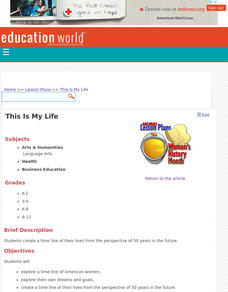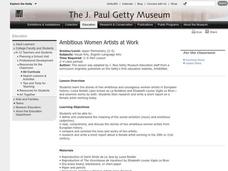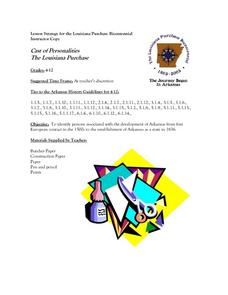US National Archives
Susan B. Anthony and the Struggle for Suffrage
Susan B. Anthony was willing to break the law to gain voting rights for women. Young historians investigate Anthony's willingness to go to jail to draw attention to the suffrage movement. They read and discuss primary source documents to...
American Institute of Physics
When Computers Wore Skirts: Katherine Johnson, Christine Darden, and the “West Computers”
Did you know that people, known as computers, performed the complex calculations that are now done by electronic computers? Three of these human computers, Katherine Johnson, Christine Darden, and Melba Roy Mouton are featured in a...
Curated OER
Abigail and Her Sisters
The 10th lesson in this series has researchers examining a packet of letters from Abigail Adams to her sisters. Scholars note examples of the themes that appear throughout the letters.
A Mighty Girl
Tu Youyou
Meet Tu Youyou, the first woman from China to win a Nobel Prize. Display a poster of Youyou in your classroom to inspire young scientists to persevere where others have failed. Her discovery of artemisinin to cure malaria has saved...
Curated OER
Abigail as Mother (Part 1)
In part one of a two-part series, scholars compare two of Abigail Adams' letters: one to her son and the other to her daughter. Researchers use the provided worksheets to contrast evidence of the tone and themes in the two letters.
John F. Kennedy Center
Harriet Tubman: An Informative and Impressionistic Look
Informational text and impressionistic art lead a lesson about Harriet Tubman. Working in teams, scholars examine a variety of resources. They analyze, compare, and contrast the work. Using their research findings, pupils create an...
Curated OER
Arkansas History Lesson: Arkansans
Third graders investigate famous Arkansans and their contributions. In this Arkansas history lesson, 3rd graders are divided into small groups and use a variety of resources to research one important Arkansan. Students write a biography...
Curated OER
"ART ZOO 'Blacks in the Westward Movement', 'What Can You Do with a Portrait', and 'Of Beetles, Worms, and Leaves of Grass'"
Learners study black history, examine portraits and portrait making and create their own portraits, and investigate their natural environment. This humanities lesson provides a text that can be used to teach lessons in black...
PBS
Universal Declaration of Human Rights
What rights are guaranteed to young scholars? Do they align with the Universal Declaration of Human Rights, which was approved by the United Nations in 1948? Middle and high schoolers present persuasive arguments about the rights they...
Curated OER
This Is My Life
Students create a time line of their lives from the perspective of 50 years in the future.
Curated OER
Pizza Biography
A biography writing lesson with a tasty twist! Kids create a "visual biography" in which each pizza slice represents a paragraph, and toppings represent supporting details. They learn research techniques, note-taking skills, and how to...
National Woman's History Museum
African American Activists
Ida B. Wells, Rosa Parks, and Fannie Lour Hammer are three African American activists who stood up for change. Though living in different time periods, all three women sought justice and equality. Class members examine primary source...
Curated OER
Abigail as Feminist
Young historians examine a 1778 letter from Abigail Adams to John Thaxter and another from Abigail to her husband John Adams, written in 1776, that reveal her views on the perceived role of women and the laws that governed women's roles....
Curated OER
Antebellum Revivalism and Reform
A gold mine for American history teachers, this presentation cascades through the middle of the 19th century with the central themes of moral and social reform. Between the blossoming Mormon church, the tightening of the Temperance...
Curated OER
Exploring Women's History
Students read and analyze Jessie Benton Fremont's travelogue of her trip out west in 1849 to identify the gender roles, social attitudes and class distinctions of the time. They then adapt the the travelogue into a film script.
National Woman's History Museum
Martha Hughes Cannon: Doctor, Wife, Mother, Senator
Each state is entitled to two statues in the National Statuary Hall Collection in Washington, D.C. After reading about Utah's debate over whether or not Martha Hughes Cannon should be represented by one of their statues, individuals...
Curated OER
SPEECHES TO INTRODUCE
Pupils create multimedia speeches of introduction which focus on women and Hispanics. They introduce their famous person and, using a video camera, video tape their speeches.
Curated OER
Ambitious Women Artists at Work
Examine the works of Luisa Roldan and Elisabeth Louise Vigee Le Brun. Learners view various pieces of art from each of the artists and read about their lives. They discuss the information and construct a Venn diagram, comparing the two...
Education Oasis
Creative Writing Unit: Analyzing, Interpreting, Discussing and Writing Various Genres of African-American Literature
A six-week unit takes high schoolers through various works of African-American literature, including poems, plays, and short stories. The lesson plan format includes a week-by-week description of activities, goals, materials, and...
Curated OER
Cast of Personalities - The Louisiana Purchase
The origins of the state of Arkansas are the focus of this history lesson plan. Elementary schoolers to high schoolers identify persons associated with the development of the state from the very first European contact to statehood in...
Curated OER
What Women Want
Students investigate the role of women in leadership in history. They conduct research in order to find the real story. The lesson stresses the fact that women are not well known in history. There is a variety of activities in this unit...
National Woman's History Museum
Stacey Abrams: Changing the Trajectory of Protecting People’s Voices and Votes
In this project-based learning lesson, young social scientists investigate Stacey Abrams' campaign to protect the voting rights of people across the nation. Investigators learn how to annotate assigned articles, watch videos, and collect...
Curated OER
Abigail at Seventeen
Young historians analyze a letter 17-year-old Abigail Adams wrote to her cousin and identify the aphorism Adams used. Participants select a line from the letter and create an illustration of the aphorism.
Nationhood
Telling Stories: Narratives of Nationhood
Three lessons make up a unit on the birth of Canada. Learners in the third grade will analyze famous works of art, research historical events, and discuss the role women played in the early development of Canada. Writing, history, and...

























